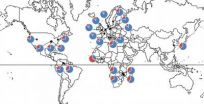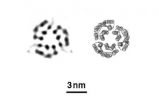(Press-News.org) Research by the University of Southampton has provided new insight into the consequence of accumulated 'misfolded proteins' in neurodegenerative disorders, such as Prion and Alzheimer's disease.
Prion and Alzheimer's disease are protein misfolding brain diseases, where genetic mutations, or more commonly, interactions between an individual's genetics and environmental influences cause functional proteins in neurons to become misfolded or misrouted. In these diseases, there is a progressive death of nerve cells in specific brain regions, which is associated with the increasing extracellular or intracellular accumulation of misfolded proteins. This leads to synapse degeneration and eventual loss of nerve cells and cognitive and behavioural conditions associated with the disease.
To increase the understanding of the disease mechanisms, the researchers, led by Dr Ayodeji Asuni from the University's Centre for Biological Sciences, compared prion disease brain tissue, which mirrors key features of Alzheimer's disease, and the brain of control mice.
They found that the degenerative process is paralleled by an increase in astrocytes – a major support cell in the brain – and four specific astrocytes-associated proteins: GFAP (structural protein), peroxiredoxin-6 (an antioxidant protein), EAAT-2 (glutamate transporter), and Clusterin (a chaperone protein). These are produced in greater amounts in response to the misfolding protein, perhaps to provide support and protection for neurons in the brain.
Current research has identified Clusterin as a biomarker for Alzheimer's disease and Dr Asuni's team extended their investigation to address whether Clusterin changes in the brain could be detected in the blood; such a result would have confirmed Clusterin as a potential biomarker for brain disease.
Dr Asuni says: "In contrast to observations made in Alzheimer's disease, the increased Clusterin expression in the brain was not reflected in the circulating levels of Clusterin in late-stage prion disease.
"So we caution against the assumption that plasma levels of Clusterin provide an alternate peripheral measure for the progression of brain degeneration. We believe the observations from our study in experimental conditions, in which potential confounds can be well controlled, will likely be of value in the interpretation of results from Alzheimer's disease patients."
INFORMATION:
The study, which is published in The Journal of Biological Chemistry, was carried out in the University's Centre for Biological Sciences as a collaboration between the labs of Professor Vincent O'Connor and Professor Hugh Perry. The research effort was led by Dr Ayodeji Asuni with contributions from Dr Bryony Gray, Dr Joanne Bailey and Dr Paul Skipp. It was funded by the Medical Research Council.
New insight into protein misfolding in neurodegenerative disorders
2014-02-14
ELSE PRESS RELEASES FROM THIS DATE:
Geographical passwords worth their salt
2014-02-14
It's much easier to remember a place you have visited than a long, complicated password, which is why computer scientist Ziyad Al-Salloum of ZSS-Research in Ras Al Khaimah, UAE, is developing a system he calls geographical passwords.
Writing in a freely available "open access" research paper in the International Journal of Security and Networks, Al-Salloum emphasizes how increasingly complicated our online lives are becoming with more and more accounts requiring more and more passwords. Moreover, he adds that even strong, but conventional passwords are a security risk ...
Antimicrobial preservation strategies to prevent food contamination
2014-02-14
New Rochelle, NY, February 13, 2014—Food spoiling and poisoning caused by microbial contamination can cause major health, social, and economic problems. The broad scope of antimicrobial approaches to kill or prevent the growth of microorganisms in foods and beverages, including a variety of natural and artificial preservative strategies, are described in a comprehensive Review article in Industrial Biotechnology, a peer-reviewed journal from Mary Ann Liebert, Inc., publishers. The article is available on the Industrial Biotechnology website.
In the Review "Ingredient ...
New depression treatments reported
2014-02-14
MAYWOOD, IL – New insights into the physiological causes of depression are leading to treatments beyond common antidepressants such as Prozac and Zoloft, researchers are reporting in the in the journal Current Psychiatry.
Depression treatments on the horizon include new medications, electrical and magnetic stimulation of the brain and long-term cognitive behavioral therapy for stress management.
Authors are Murali Rao, MD, and Julie M. Alderson, DO. Rao is professor and chair of the Department of Psychiatry and Behavioral Neurosciences at Loyola University Chicago ...
Geographic variation of human gut microbes tied to obesity
2014-02-14
People living in cold, northern latitudes have bacteria in their guts that may predispose them to obesity, according to a new study by researchers at the University of California, Berkeley, and the University of Arizona, Tucson.
The researchers' analysis of the gut microbes of more than a thousand people from around the world showed that those living in northern latitudes had more gut bacteria that have been linked to obesity than did people living farther south.
The meta-analysis of six earlier studies by UC Berkeley graduate student Taichi Suzuki and evolutionary ...
What do women want? It depends on the time of the month
2014-02-14
If she loves you and then she loves you not, don't blame the petals of that daisy. Blame evolution.
UCLA researchers analyzed dozens of published and unpublished studies on how women's preferences for mates change throughout the menstrual cycle. Their findings suggest that ovulating women have evolved to prefer mates who display sexy traits – such as a masculine body type and facial features, dominant behavior and certain scents – but not traits typically desired in long-term mates.
So, desires for those masculine characteristics, which are thought to have been ...
Another reason to not mix work and family: Money makes parenting less meaningful
2014-02-14
Austin – February 14, 2014 - Money and parenting don't mix. That's according to new research that suggests that merely thinking about money diminishes the meaning people derive from parenting. The study is one among a growing number that identifies when, why, and how parenthood is associated with happiness or misery.
"The relationship between parenthood and well-being is not one and the same for all parents," says Kostadin Kushlev of the University of British Columbia. While this may seems like an obvious claim, social scientists until now have yet to identify the psychological ...
In-hospital formula use deters breastfeeding
2014-02-14
(SACRAMENTO, Calif.) — When mothers feed their newborns formula in the hospital, they are less likely to fully breastfeed their babies in the second month of life and more likely to quit breastfeeding early, even if they had hoped to breastfeed longer, UC Davis researchers have found.
"We are a step closer to showing that giving formula in the hospital can cause problems by reducing how much women breastfeed later," says Caroline Chantry, lead author and professor of clinical pediatrics at UC Davis Medical Center. "Despite being highly motivated to breastfeed their babies, ...
Superbright and fast X-rays image single layer of proteins
2014-02-14
RICHLAND, Wash. -- In biology, a protein's shape is key to understanding how it causes disease or toxicity. Researchers who use X-rays to takes snapshots of proteins need a billion copies of the same protein stacked and packed into a neat crystal. Now, scientists using exceptionally bright and fast X-rays can take a picture that rivals conventional methods with a sheet of proteins just one protein molecule thick.
Using a type of laser known as XFEL, the technique opens the door to learning the structural details of almost 25 percent of known proteins, many of which have ...
Head, neck injuries may increase stroke risk among trauma patients younger than 50
2014-02-14
Suffering an injury to the head or neck increases ischemic stroke risk three-fold among trauma patients younger than 50, according to research presented at the American Stroke Association's International Stroke Conference 2014.
"These findings are important because strokes after trauma might be preventable," said Christine Fox, M.D., M.A.S., lead author and assistant professor of neurology at the University of California San Francisco.
Researchers studied the health records of 1.3 million patients younger than 50 years who had been treated in emergency trauma rooms. ...
Hispanic stroke patients less likely to receive clot-busting drugs in
2014-02-14
Hispanic stroke patients admitted to hospitals in the border states of California, Arizona, New Mexico and Texas were less likely than non-Hispanics in the same border states to receive clot-busting drugs and more likely to die, according to research presented at the American Stroke Association's International Stroke Conference 2014.
Researchers analyzed stroke care for Hispanic and non-Hispanic patients according to demographics and clinical characteristics in states bordering Mexico and states not on the Mexican border. They found:
Of the nearly 35,000 Hispanic stroke ...



